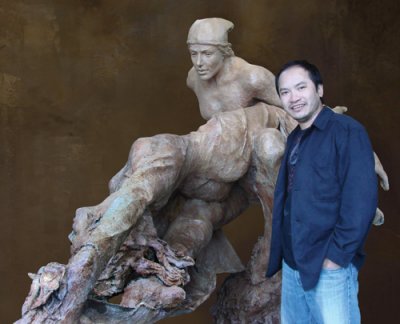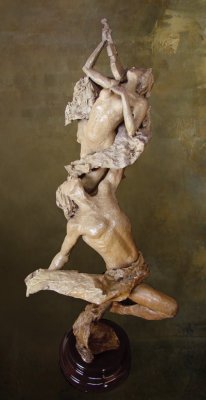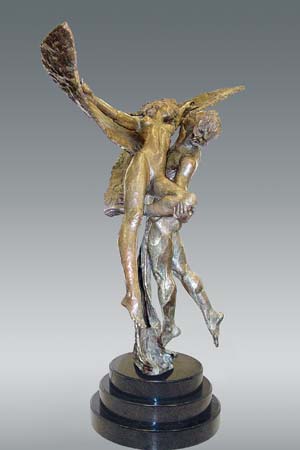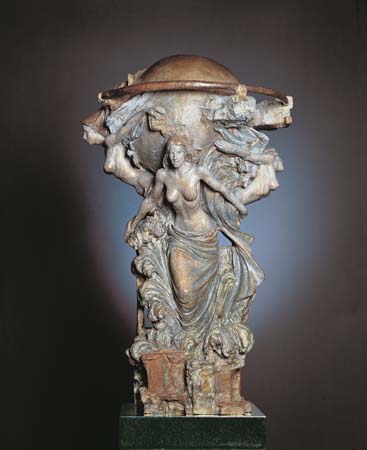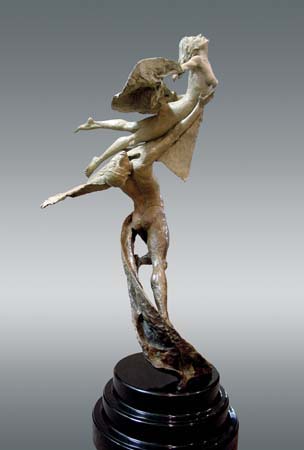Nguyen Tuan received his Fine Arts degree from the Art Institute of Southern California in Laguna Beach, CA. He is a recipient of the prestigious Gloria Medal from the National Sculptor Society (New York). In 2006, Tuan received the Gold Medal for Sculpture from the California Art Club for his work “Rendezvous”. Among his most notable public installations are the Vietnam War Memorial in Westminster, California, the heroic sculpture of Saint Therese in Mobile, Alabama, and the extensive public collection of his works at the Plaza in Orlando, Florida. Tuan’s latest project is the creation of a Vietnamese Refugee Memorial. Tuan’s works can be found in the permanent collections of the Pasadena Museum of Art and the White House.
he story of N.Tuan, creator of the inspirational Vietnam War Memorial in Westminster, California; the dramatically spiritual bronze of Saint Therese “the little flower” in Mobile, Alabama; the breathtaking collection of heroic sculptures in Kuhn Development Corporation in Orlando, Plaza in Orlando, Florida and a vast collection of other outstanding bronze sculptures, began in Saigon, South Vietnam when Tuan was born into a family of wealth, privilege and royal lineage.
The early years for Tuan were carefree, surrounded by family and friends and insolated from the war that raged in the countryside. Life was good, up until the fall of Saigon on April 30th, 1975. Overnight, Tuan’s life was turned upside-down; oppression gripped the country and freedom and privilege became relics of the past.
Tuan’s father, a well known and respected architect, was taken away to be “re-educated”, the family compound was divided up and life became harsh and restrictive. The whole of South Vietnam changed from a country fighting to retain its freedom to one unified under the oppression of Communist rule.
In a way, the return of Tuan’s father from the re-education camp began shaping Tuan into the man we know today. Having refused to work for the Communists, Tuan’s father turned to his love of sculpting to help maintain his sanity and at his side was his son Tuan. Day after day they sculpted together, the mentor and his student, and even though they did not always agree on style and composition, Tuan began to learn the skills that were to lead him to his destiny.
The oppression of the Communist régime created an overwhelming desire within the young Tuan to regain his freedom, eventually leading him to a near-fatal escape attempt. This failed attempt to escape the grip of the Communists landed him in a force labor camp that would have broken a lesser man, but instead, Tuan created opportunity by using the red clay from the floor of his cell to sculpt the likenesses of fellow prisoners. These prison sculptures helped to make prison life more bearable for the young artist. After six long months in the prison camp and eighteen more months of hard labor, Tuan’s family was able to arrange for his release.
With the support of his family, especially his father with whom he continued to sculpt, Tuan grew stronger and more confident with each passing day until he decided to put it all on the line for freedom once again. This time, after two arduous months struggling through the jungles of Southeast Asia, facing danger at every turn, he succeeded in escaping through Cambodia to Thailand. He was assigned to a refugee camp in Thailand for a year before being transferred to the Philippines where he learned English and created sculptures to honor escapees before gaining sponsorship to the United States where he finally found true freedom in 1988.
After gaining some hands-on experience at a bonze foundry in Northern California and living the life of a starving artist for a time, Tuan moved to Southern California to study fine art at the prestigious Art Institute of Southern California in Laguna Beach for five years before dedicating his life to making the world a more beautiful place with his art and furthering the world’s understanding of the “Existential Balance” and its importance to the human experience.
“My sincere hope is that my art will successfully stimulate others to see the beauty of this world and to accept its balance. Balance is central to existence and is a basic human need; to lead a balanced life is to find its center.” – N.Tuan
In 1994 the National Sculpture Society in New York honored Tuan for being a young sculptor with a meritorious body of work by presenting his with the coveted Gloria Medal. In 1995 he was awarded the prestigious Gold Medal for sculpture by the California Art Club and in 1998 he won the national competition for the design and sculpting of the Vietnam War Memorial by the city of Westminster, California.
Some of the most beautiful and timeless sculptures to be found anywhere bear the mark of N.Tuan. From the breathtaking heroic soldiers at the Vietnam War Memorial in Westminster, California, his awe-inspiring larger-than-life sculpture of Saint Therese “the little flower” in Mobile, Alabama and romantic “Rendezvous” overlooking the Pacific Ocean in Laguna Beach, California to the vast body of his works that grace private and public collections the sculptures of Tuan enriched the lives of countless art patrons and promise to touch even more lives in decades to come.
“Art is vital for me. It is almost a religion. It means to believe in people, in life, in love. It is a response to what is beautiful and simple. As an artist I do what I do for no other purpose than to express my feelings.” – N.Tuan

